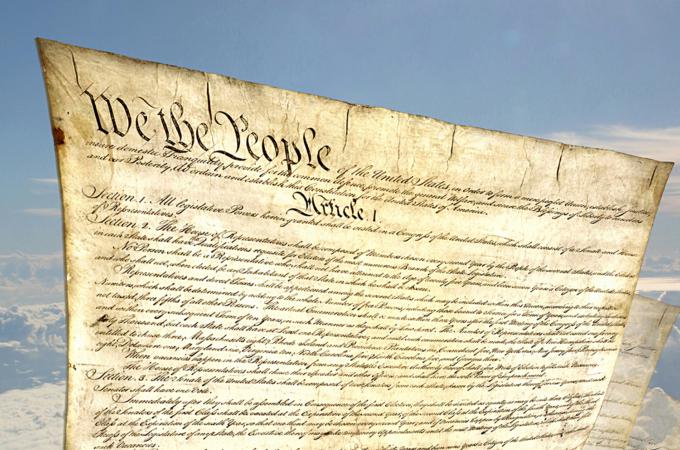Relegating the first of our freedoms to the back of the bus
On Sept. 7, the U.S. Commission on Civil Rights issued a report on reconciling nondiscrimination principles with civil liberties. The summary stated, "Civil rights protections ensuring nondiscrimination...are of preeminent importance in American jurisprudence. Religious exemptions to the protections of civil rights based upon classifications such as ... sexual orientation and gender identity...significantly infringe upon these civil rights."
As the commission's chairman, Martin Castro, said in an accompanying statement, "The phrases 'religious liberty' and 'religious freedom' will stand for nothing except hypocrisy so long as they remain code words for discrimination, intolerance, racism, sexism, homophobia, Islamophobia, Christian supremacy or any form of intolerance." Let me paraphrase: Religious freedom does not really count as a civil right; only antidiscrimination does. Religious liberty is just a second-class right. Intolerance in any form is bad, then, unless it's intolerance of religious freedom.
Let's examine a little history to get some perspective on this new-fangled denigration of religion. On Sept. 17, we just commemorated Constitution Day, the anniversary of the day in 1787 when the Constitutional Convention issued its draft of our Constitution to the people of the various states for ratification. In the body of the Constitution, there were two provisions dealing with religion: The Constitution guaranteed that there would be no religious test for public office in Article VI; and there was an allowance for being able to take oaths of office by swearing or by affirmation, an accommodation to Quakers and others, a religious exemption if you will, for those who categorically refused to swear.
One of the first things the First Congress did was to propose a Bill of Rights, which became the first 10 amendments to the Constitution and were ratified in 1791, including its First Amendment. Not by accident did the First Amendment begin, like Magna Carta, with the subject of religion: "Congress shall make no law respecting an establishment of religion, or prohibiting the free exercise thereof."
Religious freedom was dealt with even before freedom of speech and of the press, so important was it considered. To a great degree our new country was populated by those who had fled the religious persecution in Europe, and so freedom of religion was paramount in their minds.
As Archbishop William E. Lori of Baltimore, chair of the U.S. Catholic Bishops Conference Committee for Religious Liberty said in response to Chairman Castro's statement, "These statements painting those who support religious freedom with the broad brush of bigotry are reckless and reveal a profound disregard for the religious foundations of his own work.... Men and women of faith were many in number during the most powerful marches of the civil rights era. Can we imagine the civil rights movement without Rev. Martin Luther King, Father Theodore Hesburgh, and Rabbi Abraham Joshua Heschel?"
And so religious freedom is not a second-class right. It shouldn't have to go to the back of the bus. Let me give a couple of other examples from U.S. history. Roger Williams greatly valued this freedom. The founder of Rhode Island who arrived in Puritan Boston in 1631, he was driven from the Massachusetts Bay Colony for his religious dissent. His colony would allow freedom of religion to everyone: Protestants, Quakers, Catholics, Jews, and Muslims -- a total novelty in world history. In 1658, the Rhode Island General Assembly reminded the other colonies in New England that "freedom of different consciences, to be protected from enforcements, was the principal ground of our Charter....which freedom we still prize as the greatest happiness that men can possess in this world."
As early as the 1840s, Abraham Lincoln had occasion to join his voice to the cause of religious freedom when the nativism of the Know-Nothings was exhibiting a certain anti-Catholic strain: "The guarantee of the rights of conscience, as found in our Constitution, is most sacred and inviolable, and one that belongs no less to the Catholic, than to the Protestant, and...all attempts to abridge or interfere with these rights, either of Catholic or Protestant, either directly or indirectly, have our decided disapprobation, and shall ever have our most effective opposition."
I would only add that, if he were speaking today, Lincoln would doubtless want to add that these rights apply across the board, not just to Protestant or Catholic, but to Jew or Muslim, Mormon or atheist. The fact is that new assertions of government power to address discrimination can threaten religious conscience in new ways. To require serious consideration of the burden on religious freedom, under both federal and state Religious Freedom Restoration Acts, is neither hypocrisy nor bigotry.
- Dwight G. Duncan is professor at UMass School of Law Dartmouth. He holds degrees in both civil and canon law.



















